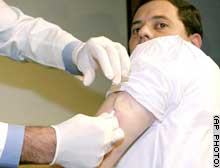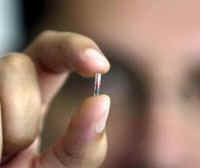VeriChip
Implantable human tracking chip launched
http://www.cnn.com/2003/TECH/ptech/07/18/human.chip.ap/index.html
Injected under your skin
Monday, July 21, 2003 Posted: 11:06 AM EDT (1506
GMT)
 |

Carlos Altamirano is implanted with the VeriChip, a microchip that
is used to confirm everything from health history to identity.
Story Tools
| HOW
MUCH? |
|
One chip costs $150 and has a $50 annual fee. The scanning
device and related software cost $1,200. Users can update
and manage their chips' information by calling a 24-hour
customer service line.
|
|
MEXICO CITY, Mexico (AP) -- Borrowing
from technology for tracking pets, a U.S. company on Thursday launched Mexican
sales of microchips that can be implanted under a person's skin and used to
confirm health history and identity.
The microchips, already available in the United States, could tap into a
growing industry surrounding Mexico's criminal concerns. Kidnappings, robberies
and fraud are common here, and Mexicans are constantly looking for ways to
protect themselves against crime.
The microchip, the size of a grain of rice, is implanted in the arm or hip.
Hospital officials and security guards use a scanning device to download a
serial number, which they then use to access blood type, name and other
information on a computer.
Implanted into the arm
In a two-hour presentation, Palm Beach, Florida-based Applied Digital
Solutions introduced reporters to the VeriChip and used a syringe-like device
and local anesthetic to implant a sample in the arm of employee Carlos
Altamirano.
"It doesn't hurt at all," he said. "The whole process is just
painless."
Another chip user, Luis Valdez, who is diabetic, said the chip is "as
innovative to me as the cell phone."
In the United States, the Food and Drug Administration has said it would not
regulate the implant as long as it contains no medical data. Thus, the
information is stored in a separate database and not on the chip itself.
Although regulations are different in Mexico, the Mexican version of the chip
will still use the database framework.
Hospitals to get scanners
Antonio Aceves, the director of the Mexican company in charge of distributing
the chip here, said that in the first year of sales, the company hoped to
implant chips in 10,000 people and ensure that at least 70 percent of all
hospitals had the technology to read the devices.

Antonio Aceves holds the VeriChip.
|
 |
Similar technology has been used on dogs and cats as a way to identify the
pets if they are lost or stolen.
Company officials said they are working on developing similar technology that
would use satellites to help find people who may have been kidnapped.
While the idea of using the chip to track people has raised privacy concerns
in the United States, the idea has been popular with Mexicans.
For now, VeriChip can help confirm a kidnap victim's identity only after a
body is found.
Мексиканцам
будут
вживлять
идентификационные
чипы
http://www.compulenta.ru/2003/7/18/40861/
18 июля 2003
года, 13:42; текст:
Иван
Карташев
Американская
компания Applied Digital
Solutions объявила о
начале
продаж
вживляемых
под кожу
устройств VeriChip
на
мексиканском
рынке.
Напомним, что
VeriChip
представляет
собой
миниатюрную
микросхему
размером
примерно с
рисовое
зернышко. В
памяти чипа
может
храниться
самая разная
информация -
от имени
владельца и
его адреса до
разного рода
медицинской
информации.
Первоначально
подобные
чипы
предназначались
для
вживления
домашним
животным с
целью
упрощения
наблюдения
за ними.
Устройства
VeriChip уже
продаются в
США, несмотря
на протесты
ряда
организаций,
утверждающих,
что
использование
подобных
устройств
угрожает
конфиденциальности
американцев.
Использование
VeriChip было разрешено
Управлением
по
медикаментам
и пищевым
продуктам
США (FDA) в конце
прошлого
года.
Вживление
чипов людям
можно
производить
без
предварительного
разрешения FDA
при условии,
что в памяти
чипа нет
конфиденциальной
медицинской
информации.
В Мексике
подобных
ограничений
нет, и в чипах
можно
хранить
любые данные,
в том числе,
медицинские.
Именно
медицина и
должна стать
основной
сферой
применения VeriChip
на
территории
Мексики. В
течение
первого года
продаж в
Мексике
планируется
реализовать
около 10000
устройств и
оснастить
оборудованием
для
считывания
информации 70%
медицинский
учреждений
страны.
Стоимость
вживления
чипа
составит 150
долларов США,
и еще 50
долларов
придется
платить
ежегодно за
обновление
информации в
памяти чипа.
Сканер для
считывания
информации c
VeriChip стоит 1200
долларов.
Помимо
учреждений
здравоохранения,
чипы могут
использовать
правоохранительные
органы.
Другие
новости на
эту тему
можно найти в
разделах  Средства
безопасности
и
идентификации
Средства
безопасности
и
идентификации
Источник: Applied
Digital Solutions
Сделать
закладку | Послать
другу | Поправки
| Написать
редактору
|
Последние
новости: Кадр
дня: Часы с USB-драйвом...
Walt Disney будет
распространять
фильмы
через
интернет... В
мире
недооценивают
возможный
ущерб
эконимике
от СПИДа... Дальше »
Ссылки по
теме
- В
американские
паспорта
встроят
идентификаторы - 24
июля 2003 года,
13:25
- Мексиканцам
будут
вживлять
идентификационные
чипы - 18
июля 2003 года,
13:42
- В
ФСБ
создали
нового
робота для
уничтожения
бомб - 15
июля 2003 года,
15:21
- Wal-Mart
и Gillette
откладывают
использование
радиочипов
на будущее - 15
июля 2003 года,
14:29
- Система
аутентификации
по смеху - 14
июля 2003 года,
09:50
- В
евро
вставят
радиомаячки - 11
июля 2003 года,
17:31
- Компьютер
научили
человеческому
распознаванию
лиц - 4 июля
2003 года, 17:14
- Кадр
дня:
Система
досмотра, "раздевающая"
пассажиров - 30
июня 2003 года,
16:35
- OASIS
готовит
стандарт
описания
уязвимостей
в ПО - 10
июня 2003 года,
16:01
- Европа
никак не
может
создать
агентство
для защиты
от
киберпреступности - 9
июня 2003 года,
18:28
|
 ВЕРНУТЬСЯ НА
ГЛАВНУЮ
ВЕРНУТЬСЯ НА
ГЛАВНУЮ

